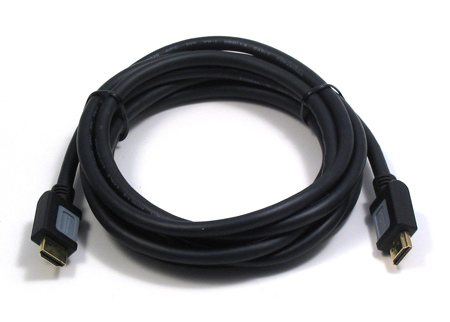In the mid 2000s when customers craved digital connections everyone looked to HDMI. The easy-to-use connector seemed like the perfect choice for the upcoming high definition revolution. There was only one problem: The cables could be used to create perfect HD digital copies. This terrified broadcasters who imagined an open market for pirates and swindlers determined to deprive honest content creators from a decent day’s wage.
Copy protection came along for the ride
In order to mollify the broadcast studios, copy protection was built into every HDMI cable. It’s not just the content protection (HDCP) that can be used to encrypt video streams into an as-yet-unbreakable form. From the very beginning HDMI was designed around the idea that some devices are “source” devices” and others are “target” devices. The full HD stream can only be fully decoded on a “target” device, meaning that it’s technically impossible to have a recording device that takes HDMI in without a lot of licensing costs.
Since the standard came into being, a third type of device, the “passthrough,” has become popular; these are HDMI switchers and AV receivers that pass the HDMI signal but do not fully decode it. Some of these devices can be configured to bypass copy protection quite easily, but I’m not going to tell you much more about that. If you want to know, I’m sure you can find what you need from Google.
What about “fair use?”
Here’s the real question. Do HDCP and the other protections in HDMI cables violate the principle of “fair use?” Copyright law says that you can do some forms of copying. You just need to make sure the copy is for your exclusive use and not for profit. That’s why, as a kid you might have recorded songs off the radio and it’s also why you have the right to record to your DVR. There’s a difference between recording off the radio and recording to a DVR though… if you recorded a song off the radio not only could you put that cassette tape on a shelf but you could re-copy it legally as long as you weren’t making multiple copies to sell. (In other words, don’t worry about that mix tape you made your 10th-grade girlfriend, the feds are just fine with it.)
A DVR is a different matter. You probably don’t even own your DVR, not if you got it from your satellite or cable company, and it’s pretty hard to get content off it if you want to keep it permanently. Use an HD capture device if you can, but they’re expensive. Problem is, more and more devices have only HDMI outputs — Blu-ray disc players long ago stopped offering analog HD outputs as part of an agreement with studios. DVRs no longer have component outputs in general, although some client boxes do. More and more, that hardware is moving over to purely HDMI.
Common sense says…
We don’t have any lawyers here on staff at The Solid Signal Blog. If you want a real legal opinion, you should find a lawyer. Honestly. But, common sense says this: if you have the right to copy something for your exclusive use, then you should be able to copy the stuff off your DVR and keep it permanently. All you need to do is not break the law by redistributing it. If you do, then you should face prosecution. It doesn’t make sense to punish you because of what you “might” do. Content creators don’t have more rights than you do and to us at least, it doesn’t seem fair.
I think there’s a great way to fix the problem. Don’t want the world flooded with cheap, high quality digital copies? All you have to do is offer your products at a fair price. It costs $50 to go to a movie for two people now. It costs $25 to buy a digital movie and $9.99 for some pay-per-view content. Most of that money goes straight into content creators’ pockets. Find a way to offer shows for permanent purchase for $2.00 and offer movies for $4 in digital form. Why would anyone bother pirating if the price was fair?
This article is brought to you by Solid Signal. Shop at Solid Signal for everything you need to live your best digital life. If you have questions, call us! We’re here at 888-233-7563. Call during East Coast business hours. If it’s after hours, fill out the form below.





